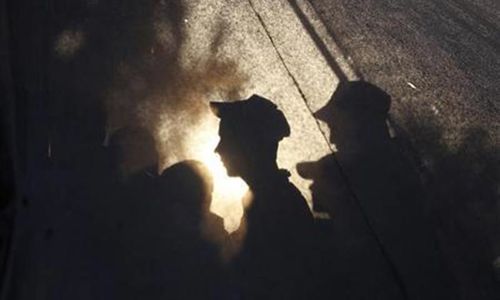India moves International Court of Justice against Jadhav's conviction
India has moved the International Court of Justice (ICJ) against Pakistan, accusing the latter of violating the Vienna Convention in the case of Indian spy Kulbhushan Jadhav, who was handed a death sentence by a Field General Court Martial (FGCM) last month.
In an application filed in the ICJ Monday, India stated that Pakistan has repeatedly denied consular access to Jadhav, a press release issued by The Hague-based ICJ said.
Examine: Indian journalist raises tough questions about Jadhav
India alleged that "it was not informed of Jadhav’s detention until long after his arrest," and learned about the death sentence through the media.
Maintaining that Jadhav was a retired officer of the Indian Navy, India claimed that he was kidnapped from Iran where he was involved in a business undertaking.
Jadhav was "shown to have been arrested in Baluchistan" on March 3, 2016, India claimed, according to the ICJ handout.
"Indian authorities were notified of that arrest on March 25, 2016," India said.
According to the press release, India requested the ICJ to ensure that Jadhav's death sentence is suspended and declared a violation of the Vienna Convention on Consular Relations.
India also sought to restrain Pakistan from "giving effect to the sentence" and asked the ICJ to direct Pakistan "to take steps to annul the decision of the military court".
"If Pakistan is unable to annul the decision, then this Court [is] to declare the decision illegal" and in violation of international law, India requested.
Indian Foreign Minister Sushma Swaraj said in a tweet Wednesday that "senior advocate Harish Salve" is representing India before ICJ in the Jadhav case.
Jadhav was arrested on March 3, 2016, through a counter-intelligence operation in Balochistan's Mashkel area for his involvement in espionage and sabotage activities against Pakistan. He was sentenced to death by the Field General Court Martial in April this year.
India had termed the death sentence awarded to Jadhav “an act of premeditated murder.”
Following the sentencing, the Indian foreign minister told the Rajya Sabha, the upper house of the Indian parliament, that Delhi would go out of its way to save Jadhav.
After a meeting with Foreign Secretary Tehmina Janjua last month, Indian High Commissioner Gautum Bambawale had claimed that Delhi made at least 13 requests for Jadhav to be granted consular access but had received no response from Pakistan.
When asked why consular access had been denied to Yadhav, Pakistan's High Commissioner to India Abdul Basit explained during an interview last month that such access is not "automatic", especially for matters that are "sensitive and related to security".
"Consular access is not provided across the board, let us remember that," he said.
Pakistan reviewing Indian move
Pakistan is reviewing the move by India to approach the ICJ regarding the Jadhav case and a decision in this regard will be issued accordingly, said Adviser to Prime Minister on Foreign Affairs Sartaj Aziz.
Speaking to reporters after a seminar in Islamabad on Wednesday, Aziz said Pakistan is reviewing India's application and the ICJ's jurisdiction in the case.
He said the Foreign Office will issue a statement about any decision taken in this regard in a couple of days.
Jadhav's trial
Jadhav was tried by an FGCM under Section 59 of the Pakistan Army Act and Section 3 of the Official Secrets Act of 1923, the statement said.
Jadhav confessed before a magistrate and court that he was tasked by Indian spy agency, the Research and Analysis Wing (RAW), to plan, coordinate and organise espionage and sabotage activities seeking to destabilise and wage war against Pakistan by impeding the efforts of law enforcement agencies for the restoration of peace in Balochistan and Karachi, the ISPR said.
Jadhav's confession
Jadhav's earlier confessional statement was aired by then head of Inter-Services Public Relations Lt Gen Asim Bajwa, in which the spy admitted his involvement in terror activities in Balochistan and Karachi.
Terming the Indian spy's arrest a 'big achievement', Bajwa said at the time that Jadhav was directly handled by the RAW chief, the Indian National Security Adviser and the RAW joint secretary.
"His goal was to disrupt the development of the China-Pakistan Economic Corridor (CPEC), with Gwadar port as a special target," Bajwa had said, adding: "This is nothing short of state-sponsored terrorism... There can be no clearer evidence of Indian interference in Pakistan."
"If an intelligence or an armed forces officer of this rank is arrested in another country, it is a big achievement," Bajwa had said, before going on to play a video of Jadhav confessing to Indian intelligence agency Research and Analysis Wing (RAW) involvement in Balochistan separatist activities in Pakistan.













































